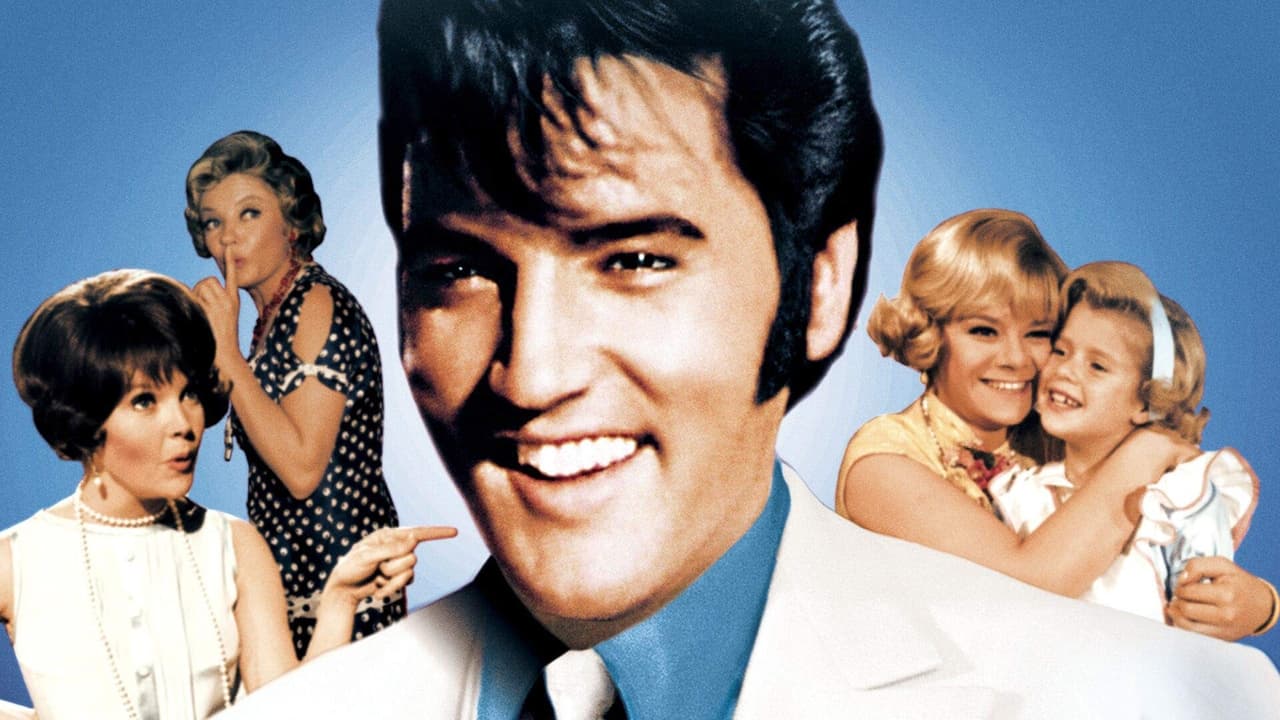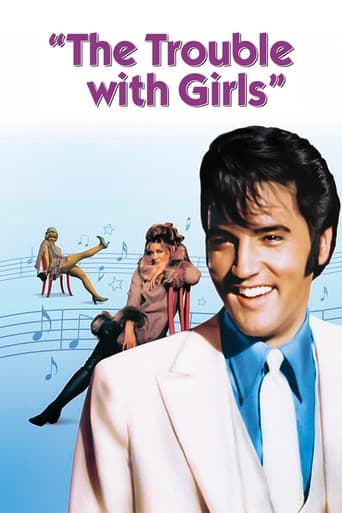

People are voting emotionally.
... View MoreI wanted to like it more than I actually did... But much of the humor totally escaped me and I walked out only mildly impressed.
... View MoreI enjoyed watching this film and would recommend other to give it a try , (as I am) but this movie, although enjoyable to watch due to the better than average acting fails to add anything new to its storyline that is all too familiar to these types of movies.
... View MoreThe story, direction, characters, and writing/dialogue is akin to taking a tranquilizer shot to the neck, but everything else was so well done.
... View MoreFor an Elvis movie his presence here is strictly secondary and he is sidelined throughout. The picture seems like it wanted to be more than it was, which is a run of the mill mystery with a few songs thrown in. It tries to tell a couple of different stories at once, none really compelling, and sort of limps along until it just ends. Of more interest as a chance to spot the familiar face in small parts than anything else. Hey look there's Vincent Price and Buffy from Family Affair and Cindy Brady and WOW look how young Dabney Coleman is! At least the film is loaded with reliable performers, Sheree North, Edward Andrews, Marlyn Mason, John Carradine etc. they just aren't given much to work with. Not a ghastly film just very ordinary and not terribly involving.
... View MoreElvis Presley runs a traveling medicine show that sweeps into a small Ohio town and stirs up the locals. Interesting (if not entirely convincing) 1920s production design (no one had hair like Elvis in the '20s...or so I've been told), cute kids running around (including Anissa Jones from "Family Affair" and an uncredited Susan Olsen from "The Brady Bunch"), Dabney Coleman doing his schmuck-thing (very well), and a hilarious Joyce Van Patten as an Olympic swimmer. Elvis drops out of sight for much of the proceedings; he's around to break up a fight or help pitch a tent, but the film is mostly about the wacky small town folk. In the final minutes, when Elvis gets up on stage with his guitar, the movie is suddenly no longer about these supporting characters--it's all about E.P. whipping the audience into a frenzy, and the cinematographer goes wild with his zoom-lens. "Girls" is misguided, oddly directed, and unsure of what audience to target, yet there are some good things in it, including an interesting milieu for its star. ** from ****
... View MoreI'd never really particularly liked this film mainly because it was nominally an Elvis movie but had Elvis pretty much co-starring in his own film. It's true that he doesn't get much screen time in this, his second-to-last scripted screen performance, but upon this screening I found that I enjoyed it more just as a film. The story is a little draggy, and fairly quirky, and this is a property that'd been shopped around for years before ending up as an Elvis Presley project.Chautauquas were popular traveling shows that, peaking around the turn of the century, brought to small towns lecturers and performers of all kinds. In "The Trouble With Girls" (weird title, more descriptive of some of his earlier '60s movies than this piece), Elvis plays the manager of a traveling Chautauqua troupe. They arrive by train in a small Iowa town and -- well -- trouble ensues. In reality, though, the trouble's mainly with the men. The film was originally titled "Chautauqua" but its name was changed because studio executives felt that nobody'd know what the heck a Chautauqua was. Didn't really matter much, anyway, because by 1969 Elvis' movies were finally not exactly packing them in and the unwieldy title "The Trouble With Girls (And How To Get Into It)" is hardly descriptive or indicative of the film's contents. Those who were still going to see Elvis' movies at the theater probably would've gone to see it if they'd titled it "Elvis Presley Movie #29," anyway.Elvis looks great in this film, with sideburns not only restored to full pre-Army glory (as they had been since late '67) but bigger and fuller than ever before. He does a fine job acting, even though his role is not as demanding as some he'd taken on if only because he was just one of an ensemble cast. It was quite a cast, too, including the likes of Vincent Price (great in a brief couple of bits as "Mister Morality") and John Carradine (only briefly seen, unfortunately -- conventional wisdom has it that this is the last film in which he and Vincent Price appeared together, though IMDB tells me that they co-starred in two more in the '80s). Dabney Coleman, ever-smarmy as a cheating druggist, is excellent as always and it's his character who ends up polarizing and driving the action forward on this rather lethargic property.But it's an Elvis movie, right? (well, sort of) So what about the songs? Well, because of the setting, all of the songs are realistic in presentation -- none of the typical musical's invisible orchestra -- and most of the Elvis tunes are further realistic in terms of their instrumentation. Elvis doesn't sing much in this film (1968's "Speedway," shot in the summer of 1967, was the last song-heavy Elvis film) but most of what he does is excellent stuff. The rousing traditional black gospel song, "Swing Down, Sweet Chariot" (a totally different song to the "Swing Low, Sweet Chariot" that most are familiar with) is done to perfection under the Chautauqua's big tent. Elvis had recorded this song back in 1960 and remade it for this film -- it was only the second of three 'religious' songs that Elvis did for the movies (the first was 1967's "Sing, You Children" from "Easy Come, Easy Go," and the third was "Let Us Pray" from 1969's "Change Of Habit"). Elvis also does a few lines of "Violet" during a medley of college fight songs (he also recorded "The Whiffenpoof Song" but, if it was included in the movie, it's missing from my copy) and he unveils a pretty and simple ballad, "Almost" near the movie's end. Along the way he and Marlyn Mason (no, not Marilyn Manson) duet on the Dixielandish "Signs Of The Zodiac," basically a novelty song. Elvis also does a song called "Clean Up Your Own Backyard," a song that pithily targets hypocrisy (small-town or big-city varieties) and that was as relevant to the situation in 1969, or today, as it was to the movie's central plot. The song is excellent and is heard here without the overdubbing that accompanied the single release. "Clean Up Your Own Back Yard" is easily among the very best of Elvis' movie songs and would have fit seamlessly within the body of work that he was laying down in the studio around this time, all of it of excellent quality (his legendary Memphis sessions of 1969 were just three or so months in the future when he made this film).This is not one of the classic Elvis films, even within the subgenre of Elvis' classic 60s musical films -- it's a drama-focused period piece in which Elvis is an underutilized part of an ensemble cast. It does, however, have some good scenes and some solid acting, though it wasn't about to give Butch and Sundance a run for their money at the box office. Elvis began production of this film a couple of months after taping the legendary 1968 TV Special and within a year would make headlines around the world as a result of his triumphant return to the concert stage. "The Trouble With Girls" was symptomatic of a Hollywood world that had palled in Elvis' mind and that would soon be totally irrelevant to who he was and who he was perceived to be. It's interesting, and has its moments, but it pales beside the real-life drama of Elvis in his element...performing live on stage. Still, for me, seeing Elvis do "Clean Up Your Own Back Yard" is, alone, reason enough to catch this rather odd film. And if you want to see Elvis in anything but a typical Elvis Presley film,' this might be the movie for you. That is, if you can't find a copy or broadcast of "Flaming Star" or "Follow That Dream."
... View MoreAlthough this film is ultimately a dreary, draggy bore, it is not an embarrassment, providing as it does a distinct change of pace from the swivel-hipped singer's wretched films of the mid-60s. Set in the 1920s, the only bikini in sight is a one-piece worn by "guest star" Joyce Van Patten, and the few songs are performed in an appropriate setting--a stage (a rarity in the later Presley movies). Elvis is the manager of a travelling tent show rocked by mini-crises and a murder. It's all very lightweight and lethargic, but it does mark a significant change from the godawfal tripe to which Presley lent his name and talent in previous years. M-G-M, however, apprehensive that an Elvis movie called "Chataqua" was too drastic a change for his fans, re-christened the film "The Trouble with Girls" (and added a subtitle--"and how to get into it"--that does not appear on screen), which has nothing to do with the movie and makes it sound like another Presley potboiler. It's a little better than that, though it now ranks as nothing more than a memento, as significant to his accomplishments as one of those scarves he doled out to the adoring females who populated his Las Vegas performances. It's a souvenir that says nothing of the man's talent or his revolutionary achievements.
... View More